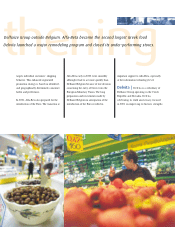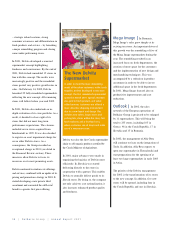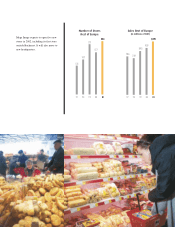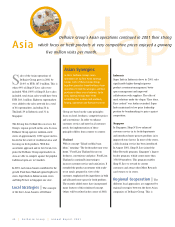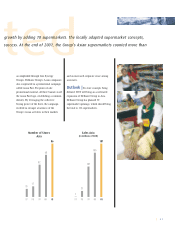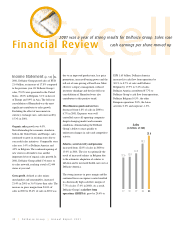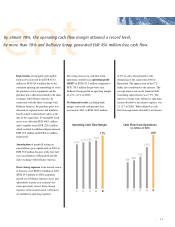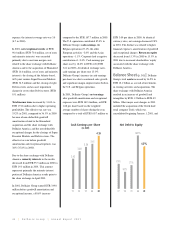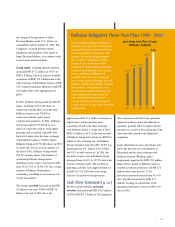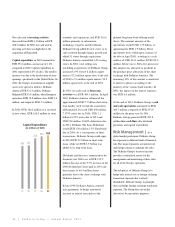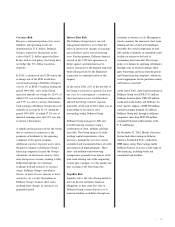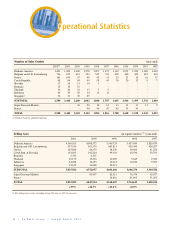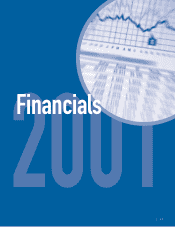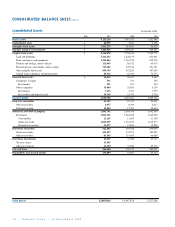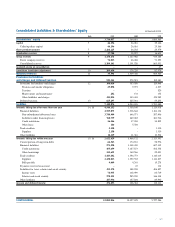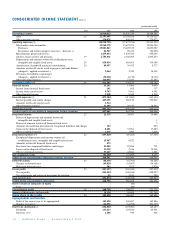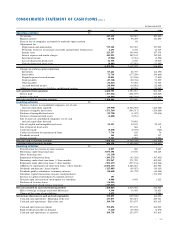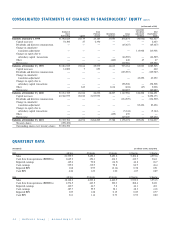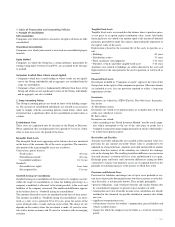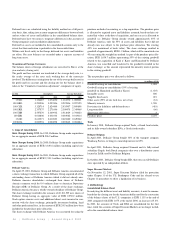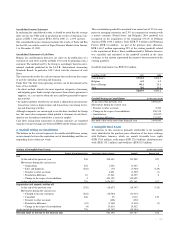Food Lion 2001 Annual Report Download - page 49
Download and view the complete annual report
Please find page 49 of the 2001 Food Lion annual report below. You can navigate through the pages in the report by either clicking on the pages listed below, or by using the keyword search tool below to find specific information within the annual report.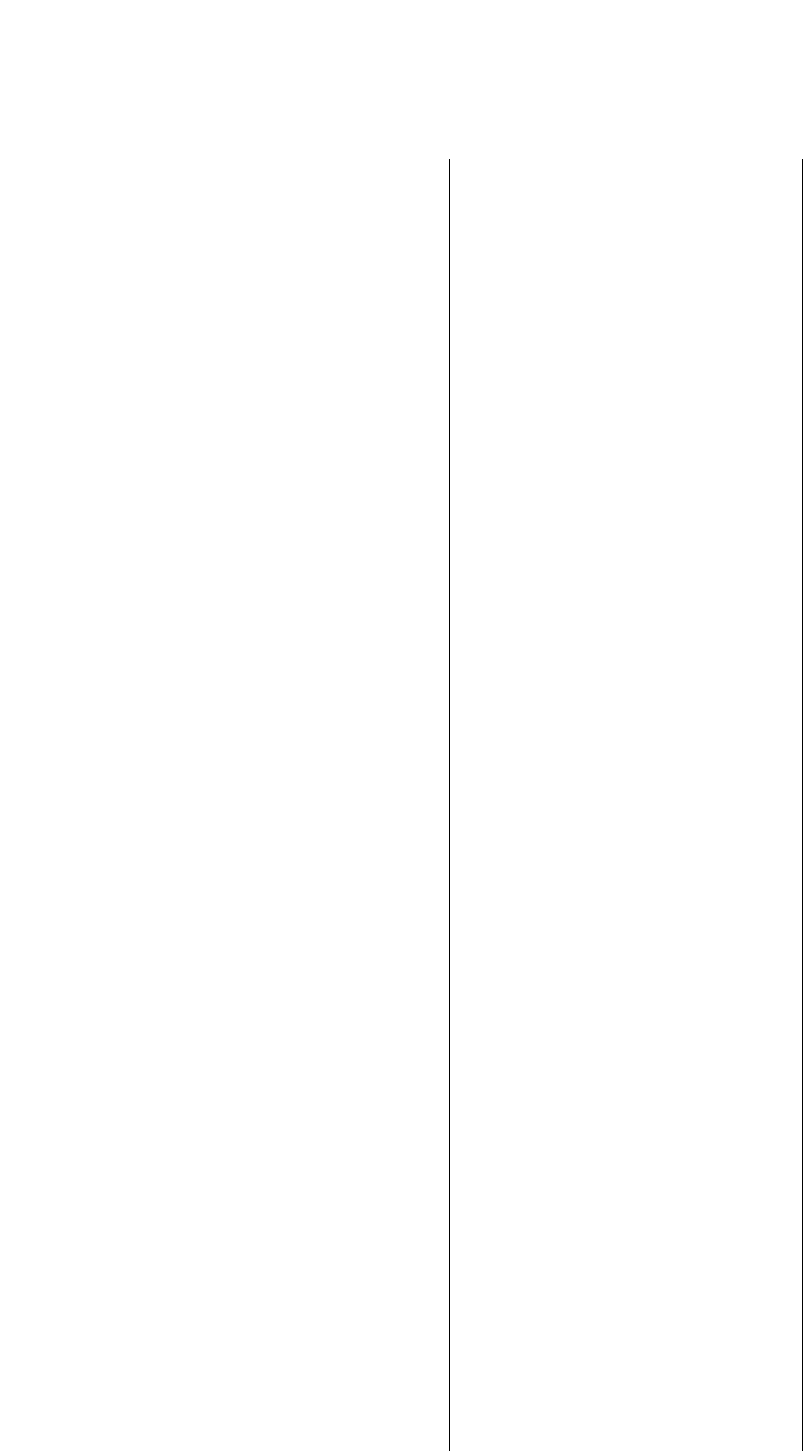
Currency Risk
Because a substantial portion of its assets,
liabilities and operating results are
denominated in U.S. dollars, Delhaize
Group is exposed to fluctuations in the
value of the U.S. dollar against the Euro.
In line with its risk policy, the Group does
not hedge this U.S. dollar translation
exposure.
In 2001, a variation of one USD cent in the
exchange rate of the EUR would have
caused cash earnings of Delhaize Group to
vary by 1% or EUR 3.3 million. During the
period 1994-2001, sales of the Group
increased annually on average by 12.9%, of
which 9.0% was at identical exchange rates
and 3.9% was due to currency fluctuations.
Cash earnings of Delhaize Group increased
annually on average by 21.1% during the
period 1994-2001, of which 17.6% was at
identical exchange rates and 3.5% was due
to currency fluctuations.
A significant transaction risk for the Group
due to variations in currencies is the
payments of dividends by the operating
companies to the parent company.
Additional currency exposure arises when
the parent company or Delhaize Group’s
financing companies finance the Group’s
subsidiaries in their local currency. Such
intra-Group cross-currency lending is fully
hedged through the use of foreign
exchange forward contracts or currency
swaps. Delhaize Group’s subsidiaries
borrow, in most of cases, directly in local
currencies. As a result, fluctuations in
Delhaize Group’s balance sheet ratios
resulting from changes in currencies are
generally limited.
Interest Rate Risk
The Delhaize Group interest rate risk
management objectives are to limit the
effect of interest rate changes on earnings
and cash flows and to lower borrowing
costs. For that purpose, Delhaize America
entered in late 1999 into agreements to
hedge against a potential increase in
interest rates prior to the planned long-term
bond offering related to the Hannaford
acquisition (as explained earlier in this
chapter).
At the end of 2001, 81% of the net debt of
the Group was fixed for a period of at least
one year. As a consequence, a variation in
short-term interest rates would not have
affected the Group’s interest expenses
materially. At the end of 2001, there was no
major hedge to fix interest rates
outstanding within Delhaize Group.
Delhaize Group manages its debt and
overall financing strategies using a
combination of short, medium and long-
term debt. The Group finances its daily
working capital requirements, when
necessary, through the use of its various
committed and uncommitted lines of credit
and commercial paper programs. These
short- and medium-term borrowing
arrangements generally bear interest at the
inter-bank offering rate of the originating
country plus a margin, or at the market rate
plus a margin at the borrowing date.
Liquidity Risk
Liquidity risk is the risk of being unable to
meet all present and future financial
obligations as they come due. One of
Delhaize Group’s major objectives is to
maintain funding availability through any
economic or business cycle. Management
closely monitors the amount of short-term
funding and mix of short-term funding to
total debt, the overall composition of total
debt and the availability of committed credit
facilities in relation to the level of
outstanding short-term debt. The Group’s
policy is to finance its operating subsidiaries
through a mix of retained earnings, third-
party borrowings and loans from the parent
and Group financing companies, whichever
is most appropriate for the particular country
and business concerned.
At the end of 2001, short-term borrowings of
Delhaize Group were EUR 571.3 million.
Delhaize America had a USD 500 million
syndicated credit facility and Delhaize “Le
Lion” parent company a EUR 500 million
commercial paper program. In addition,
Delhaize Group had, through its different
companies, more than EUR 500 million
committed bilateral credit facilities in the
U.S. and Europe.
On December 31, 2001, Moody’s Investors
Service had a Baa3 rating on Delhaize
America. Standard & Poor’s indicated a
BBB minus rating. These ratings enable
Delhaize America to access a wide range of
debt financing, including bonds and
committed bank facilities.
|47


